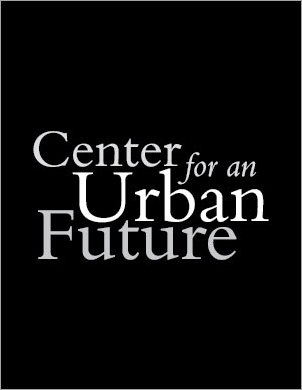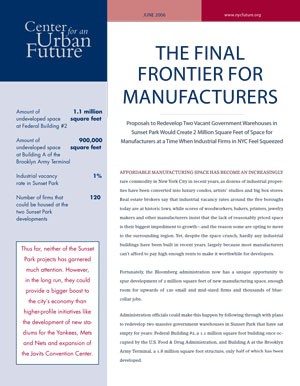Good afternoon. Thank you for the opportunity to testify today. My name is Jonathan Bowles and I am the research director of the Center for an Urban Future, a non-profit policy institute that publishes studies about economic development, education, workforce development and other issues that are important to the future of New York City.
I am here today to testify in opposition to one portion of the proposed zoning text amendments governing loft conversions in North Brooklyn. While I commend the Department of City Planning for putting together a much better loft legalization proposal than either of the bills introduced in the State Legislature, I am very disappointed that the proposed zoning text amendment now being considered would allow the conversion of industrial space to residential use within the East Williamsburg Industrial Park. I urge the commission to reconsider this part of the proposed zoning text changes--specifically, maps 5 and 6 of the application.
Allowing this zoning text change to go through would permanently remove industrial space from the market in an area that the city has designated for manufacturing companies and other industrial users. Moreover, it would do so at a time when manufacturers throughout the city are encountering a severe shortage of available industrial properties.
Over the past several years, as the economy expanded and the real estate market got tighter and tighter, so many manufacturing areas throughout the city have been converted to other uses--permanently diminishing the supply of properties for the city's manufacturers. Industrial buildings were converted to office use in the old printing district in Lower Manhattan, the far west side of Chelsea, the Midtown Garment Center and parts of Long Island City. In addition, manufacturing space has been converted for residential use in Williamsburg, Greenpoint, DUMBO and Chinatown. The City Planning Commission also recently approved a plan that rezones a large industrial area in Long Island City. And in recent years the Board of Standards & Appeals has granted dozens of zoning variances that allow building owners to convert industrial properties to residential use.
The East Williamsburg Industrial Park currently has 500 businesses and about 15,000 jobs. It's also important to note that some of the companies that are now located in the industrial park have been squeezed out of manufacturing space in other parts of the city. Is this Commission going to let them be chased out again? Or does manufacturing still have some place left in the city?
It's clear that the city's manufacturing industry is not as strong as it once was, yet the sector still provides nearly 250,000 jobs citywide. And while virtually all of the manufacturers left in the city are small or medium sized, many of them are growing. The number one problem for so many of these manufacturing companies today is that the lack of available industrial properties, in every borough.
Legalizing residential conversions in the East Williamsburg Industrial Park also doesn't make sense because it would lead to inevitable conflicts between new residents and legal industrial uses that are located nearby. It will only be so long before tenants are making complaints to city agencies about noise, truck traffic and other byproducts of industrial companies--even though the complainers would be living within a city-designated industrial park. Similarly, sanctioning illegal conversions in the industrial park would clearly encourage other landlords to convert space in other nearby industrial buildings for residential use. In fact, this is already happening. And all of this real estate pressure could easily push rental prices up to a level where few manufacturers could afford.
As it is, more than a dozen vibrant manufacturing businesses have been forced to leave the city in recent years simply because they couldn't locate affordable industrial properties. The city must do its best to make sure that this doesn't continue to happen. The City Planning Commission should start by sending a signal that some prime industrial areas will remain zoned for industrial uses.



